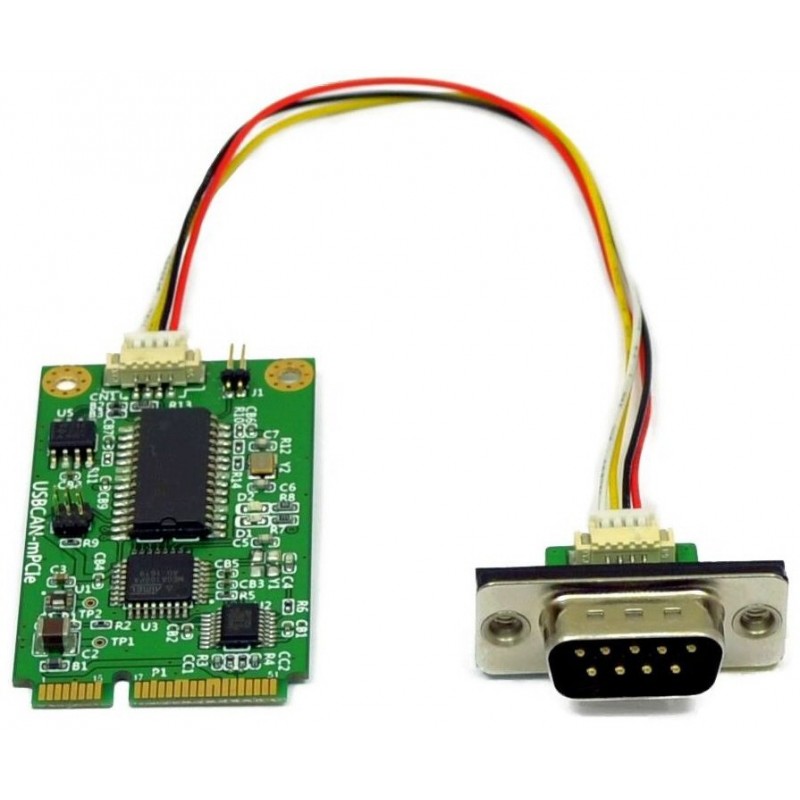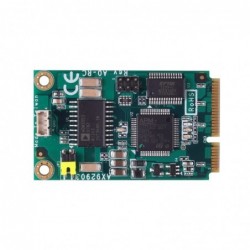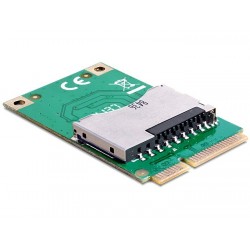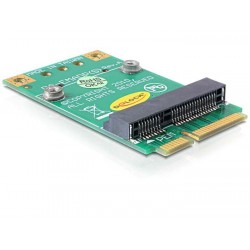

MINI PCI Express MPCIex Combi card with serial and parallel port
2 x serial ports. 1 x parallel port for full length Mini PCI Express


Connects CAN-Bus via mPCIe slot
USB 2.0 Full Speed signals on mPCIe
Supports CAN 2.0A / 2.0B, up to 1 MBit/s
CANopen supported by CANFestival
SAE J1939 protocol supported by the J1939 API
Drivers for Windows, Linux and Mac OS X
LEDs for CAN and Error
16KV ESD surge protection
DB9-connector included
Mini PCI Express to CAN Bus 2.0A / 2.0B adapter allows easy expansion of any system having a full-length Mini PCIe slot with a CAN-Bus. The mPCIe card uses USB 2.0 signals as provided on the slot. Higher layer protocols, such as CANopen can be assembled using the available development tools for complex automation control applications. Low power consumption (0.4W max.), extended temperature range (−20°C - +70°C), and a solid MTBF (23 Years at 45°C) make it an ideal expansion for industrial automation.
Usage Options
- Various software tools to interface each level of user applications:
- The ASCII conversion protocol is useful in developing and testing any CAN-BUS configurations. Users just connect via virtual COM port having a simple way to talk to the CAN controller. It can also be used to manually transmit and receive CAN frames.
- Applications programmed by users should use the VScan API library (DLL), which transparently handles the communication and ASCII conversion for the CAN frames. Programmers have to handle only the CAN frames and status information, without taking care more about the ASCII conversion in their applications. VScan API is supported in C/C++, C#, VB.NET, Delphi and LabVIEW. Under Linux SocketCAN can be used as alternative to VScan API. It supports standard Serial Line CAN (slcan) driver.
- USB-CAN Plus series also support CANFestival, an Open Source CANopen Framework. CANopen is a CAN-based higher layer protocol that is used in various application fields to unburden the developer from dealing with CAN-specific details. CANopen provides standardised communication objects for real-time data, configuration data as well as network management data.
- The SAE J1939 protocol, resting upon the CAN hardware layer, is commonly used in the commercial vehicle area. A lot of other modern protocols are based on it, like NME200, ISOBUS, MilCAN or FMS. The J1939 API also includes support for the so called Transport Protocol, which will bypass the limit of 8 data bytes per message. It's available on J1939-enabled devices. Supports Windows, Linux, .NET
ESD protection
For usage in hazardous industrial environments CAN-Bus interface is ±16kV (air) and ±8kV (contact) ESD surge protected.
Expanding countless computing systems
Mini PCI Express slots are present in various Industrial Computers, modern SBCs, Laptops and more. If there is space for the DSub-9 connector and cabling, this product is applicable as CAN-Bus expansion.

2 x serial ports. 1 x parallel port for full length Mini PCI Express

One CAN bus interface
Supports both CAN 2.0A and CAN 2.0B
Up to 1Mbps CAN transmission speed
2KV isolation
Drivers support Windows® 7/ 7 x64/ 8/ 8 x64/ 8.1/ 8.1 x64
Dimensions: 51 x 30 mm
Cable included

Mini PCI Express til SD adapter

Mini PCI Expressadapter til PCI Express, med simkort holder
